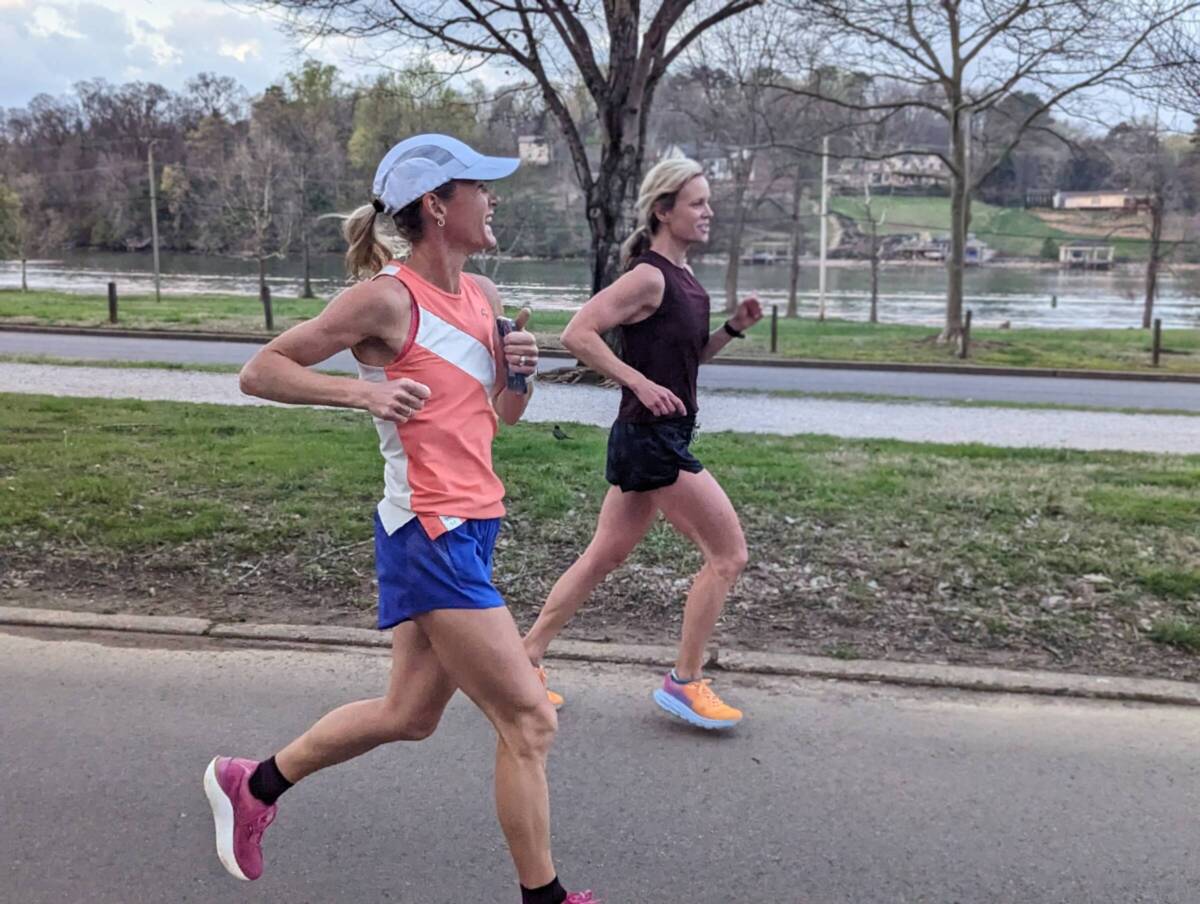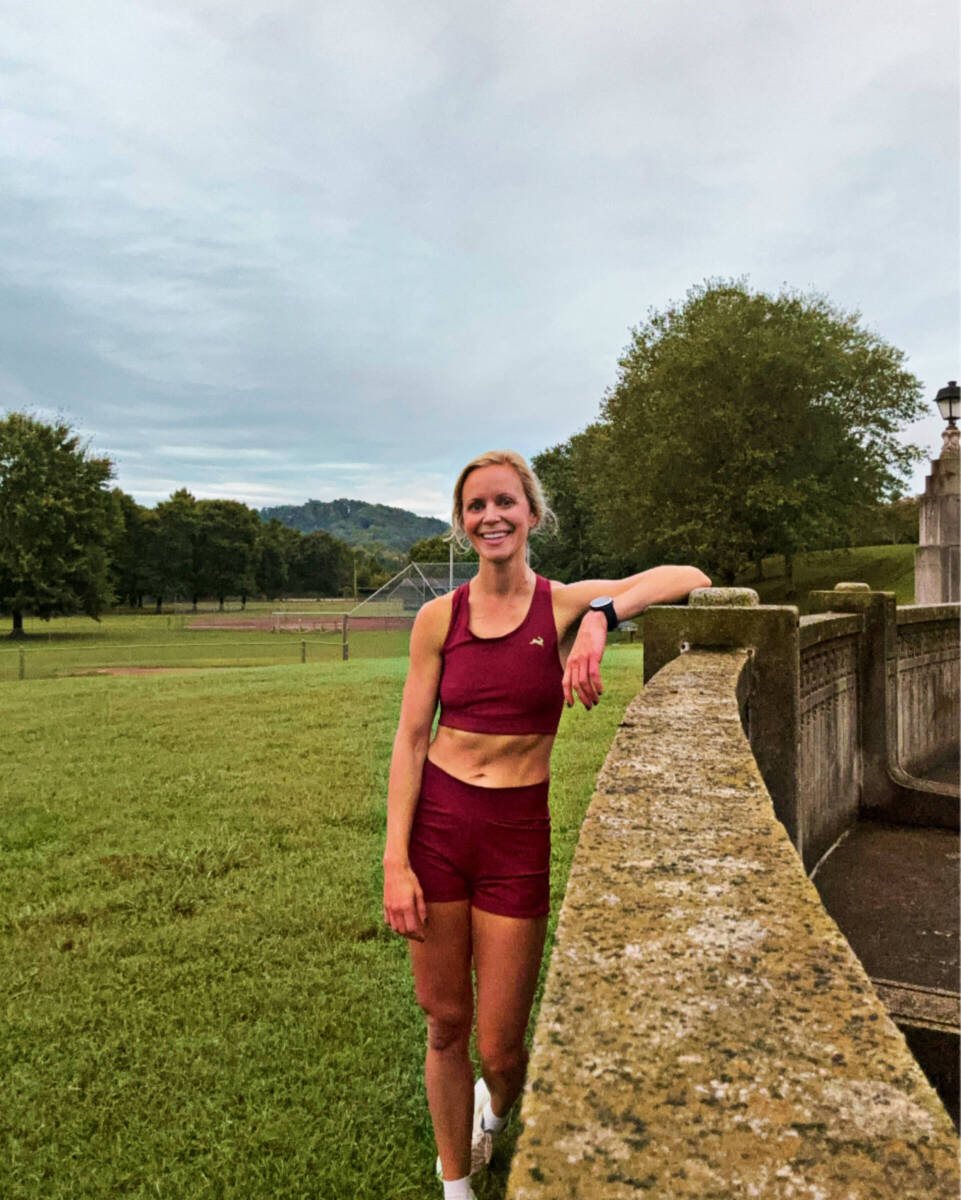Run to Lose Weight Safely (Top Tips & Mistakes)
Amy Stephens, RDN, a registered sports dietitian, says you can safely lose weight while running and avoid injury and lethargy by eating nutrient-dense food and sticking to a 300-calorie deficit. Read her tips below.

I’m going to be honest here (because there is no other way that I am), but I avoid talking about how to run to lose weight. Why? Because I believe that running is so much more than about how we look.
Table of contents
Running is about how we feel, our physical and mental health, positively influencing those around us, and MORE! I also like to view food as fuel because the human body needs food to function and you know, like stay alive.
But, I do realize that so many people start running to lose weight. Running for weight loss is the gateway. But those who try to start running while simultaneously losing weight have a higher risk of injury and also may find themselves with low energy. Not what mother runners need! This is something I have kept a close eye on as a run coach when working with my runners with weight loss goals. Several work with the guidance of an RD and we keep an eye on their energy levels and how their runs are feeling. If they start to feel bad, we either scale back the running or up their nutrition. The two must work in tandem!
I want to help others go after their fitness goals and weight loss goals safely so that they can become a permanent part of the running community! I recently did an interview with Amy Stephens, RDN, a registered sports dietitian, for The Passionate Runner podcast, which I host for RunnerClick, about the subject of how to run to lose weight safely.
Stephens (who advises recreational and elite athletes) had so many good tips on and off the podcast that I felt compelled share.
10 Tips to Run for Weight Loss
Below are 10 tips to run for weight loss. These tips support a healthy lifestyle no matter how much you run (except for number two which is specifically for weight loss).
I want you to live healthily and feel good. You are so much more than the numbers of the scale.
Eat nutrient-dense food.
No matter how much you run, you want to eat the same: aim for colorful, healthy, nutrient-dense food most of the time (about 90 percent of your diet).
If you want to lose weight, fill half your plate with veggies. The other quarter should be lean protein and then the other quarter should be carbs. Especially when running, your body needs nutrients to repair damaged tissues and bone, and fight inflammation. It also needs fuel in the form of carbs to run.
Remember that protein and fiber are slower to digest and help take up room in your stomach making you feel full longer. So, eat foods that have both such as lean meats, nuts, quinoa, yogurt, and beans.
If you’re unsure about how much to eat, find a sports dietitian to help create a plan that works for you.
Aim for a 300-calorie deficit.
If you are running to lose weight, aim to cut back your calories by about 300 calories a day, advises Stephens. Then note how you feel. One of the challenging things about running for weight loss is being able to properly fuel your body so that it can work hard and repair itself.
Therefore, you don’t want to cut your calories too much or else risk injury, lethargy, and poor performance. If you feel good with this calorie deficit, you can increase to 500 but no more than that, says Stephens.
Look for simple cuts like a tablespoon less oil with your veggies, a little less salad dressing on your greens, or a smaller snack.
Don’t diet.
You know the saying, “diets don’t work.” And they especially don’t work if you’re running.
“Diets leave people more frustrated, angry, hopeless, and at a higher weight,” says Stephens.
This includes the currently popular intermittent fasting trend and Keto diets.
- Keto isn’t effective for runners because fats take longer to break down for energy meaning you have to run really slow for that to happen. Keto=no PRs.
- Intermittent fasting makes it hard to restock glycogen and muscle-building protein. IF=poor recovery and short runs.
- Paleo supports balanced eating of healthy carbs, lean proteins, and vegetables to support the exercise. So, if you’re keen to follow any diet plan, paleo is the best.
But really, just keep what you eat SIMPLE. Stephens says: Think less about “dieting” and more about fitting in nutrient-dense foods like lean proteins, healthy starches, fresh fruits, and veggies.
Create a routine.
Just as you create a routine for your kids’ meals, do the same for yourself. Stephens says she sees the best success in running for weight loss with people who eat on a schedule. Eating at regular intervals will maintain blood sugar levels which will help you not binge or get energy dips.
That means Wednesday looks the same as Saturday. If you do a long run on Saturdays, aim to eat a bit more carbs before at dinner and as a snack pre-run, and after when you refuel.
However, your eating should roughly look the same as far as timing and contents.
Here is an example of what your meal timeline may look like:
- 6 a.m. Breakfast (pre-run meal): Bagel with peanut butter and coffee pre-run
- 9 a.m. Snack: A protein shake post-run
- 12 p.m. Lunch: Bean burrito with salad
- 3 p.m. Snack: Yogurt with an apple and a couple of spoonfuls of granola
- 7 p.m. Dinner: Fish with a baked potato and broccoli
Drink water before meals.
Drinking a glass of water before your meals and snacks will help fill up your tummy and signal that it’s full reducing your overall calorie intake. Studies show that people who drink before meals will lose weight. It’s also a great way to stay hydrated which is key for running and overall health.
Also, Stephens notes it can take up to 30 minutes for your body to secrete the hormones to let your stomach know its full. Therefore it’s also important to wait until you go back for seconds to ensure your tummy is full.
I do this with my kids. When they eat a full meal and say they are still hungry, I ask them to wait a couple of minutes before I make their second course. Almost always they tell me they aren’t hungry anymore.
Eat snacks.
A lot of new runners will gain weight for two reasons:
- They overestimate how many calories they burn running. You burn roughly one-hundred calories a mile. So, if you run 3 miles, that’s roughly a protein bar.
- You do not snack enough and then get incredibly hungry SUDDENLY, and eat the whole kitchen. When this happens, I say, “my bottom dropped out.”
Guard against this by eating regularly. (See number 4 about a regular eating schedule).
Don’t go longer than 4 hours without eating. And be sure to eat before and after your runs to help with recovery and guard against intense hunger. Also, fuel on runs that last longer than an hour.
Eating few hundred calories every few hours will prevent gorging on hundreds and hundreds of calories later.
Fuel your runs.
Eat a small snack before runs lasting over 45 minutes and a small snack when you come back. If you’ve done a long run (over an hour), eat a carb-rich snack or meal within an hour of completing your run.
This will give your muscles what they need to recover the microtears from the run and also keep intense hunger at bay.
You may have a difficult time eating because you don’t want to eat what you just burned, but eating this post-workout meal or snack will help your muscles recover so that they are stronger and keep you from binging later.
Don’t dump.
Confession: I am a dumper. I don’t measure my salad dressing, oils, peanut butter, granola, etc. I just dump it until I feel like it’s enough. This is NOT the way to try to lose weight.
If you want to lose weight, a few hundred calories here and there from dumping add up. A more effective way to safely trim calories is to measure these fatty foods and oils so that you can control your intake.
Chances are you won’t even be able to tell that you are eating less and it’ll help you safely lose weight while running.
Skip the liquid calories.
Don’t drink your calories. This doesn’t help you feel full and it definitely won’t help you lose weight. So, stay far away from juices, sodas, and control your alcohol intake which inhibits recovery, disrupts sleep, and leads to weight gain.
Drink water instead and you will help yourself lose weight while running.
Build muscle.
Don’t forget to strength train! A pound of muscle burns four more calories at rest than a pound of fat (six calories versus two)! That equals an extra 96 calories per day per pound of muscle.
So, pair weightlifting with running to lose weight and change your body composition! Research shows that lifting weights can help runners’ performance.
It also shows that lifting heavier weights and doing plyometrics is more effective in boosting running economy and performance than doing light weights and low reps.
Aim to do two thirty minutes sessions per week using simple moves such as lunges, squats, deadlifts, push-ups, pull-ups, and planks.
FAQs About Running & Weight Loss
Is running good for weight loss?
Running is probably the best exercise for weight loss because it is a total body workout that burns the most calories in less time. People can have a successful weight loss journey if they choose healthy habits like good getting sleep and eating a healthy diet with nutritious foods.
The best way to do this is to:
- Make sure you don’t eat overestimate how much you burned while running and over-eat!
- Make sure you fuel your runs so you don’t end up famished and eating the whole house!
- Be mindful of what you’re drinking because the amount of calories in drinks add up quickly.
- Recognize that losing body fat is a gradual process and losing weight quickly can be harmful to your running performance and mental health
The good news is you can avoid many weight loss mistakes by:
- Creating a meal routine that sets you up for success by fueling for your runs and refueling after.
- Planning out your dinners for the week.
- Thinking four hours ahead for what you plan to eat.
- Choosing nutrient-dense foods for 90 percent of your diet that includes plenty of vegetables, fruit, complex carbs, protein, and healthy fats and limits alcohol and desserts to 10 percent of your diet.
Is walking or running better for weight loss?
Walking is great for clearing your mind and staying active. However, if you’re looking to change your body composition, running is a more effective aerobic exercise for those with weight loss goals.
Running is better for weight loss because it has a bigger calorie burn. Just be sure to not overdue your caloric intake after your run. Eat a snack before your run (if the run is longer than 45 minutes), and eat a carb-rich snack after to avoid binging later in the day with lots of calories.
If you don’t love running, try a walk run program designed by a coach.
Can I lose weight by running 30 minutes a day?
Yes, if you run 30 minutes a day and eat healthily, you are likely to lose weight. If you run 3 miles in 30 minutes, that is roughly 300 calories that you burned. If you eat about 200 calories less per day, you are set up to lose a pound per week (3,500 calories equals one pound).
Be careful with this math though as it can set you up for disordered eating or eating disorders. If you find yourself becoming obsessive about what you’re eating and burning, then it’s time to back off or seek the help of a professional like Stephens.
Try to focus on treating your body well and doing what you think is best for it. Eat foods that are good for you and don’t worry too much about counting the intake and burning of calories.
Can you lose weight just by running?
You can lose weight by just running as running burns calories more per hour than almost any other form of exercise. Running also has an afterburn effect in which you continue to burn calories even when you aren’t running (as much as 150 calories). It also builds muscle mass which improves your basal metabolic rate — burning more calories at rest than fat.
That said, pairing weightlifting with running (and eating well!) is a surefire way to lose weight and change your body composition. You can’t ever go wrong with regular exercise and a healthy diet.






